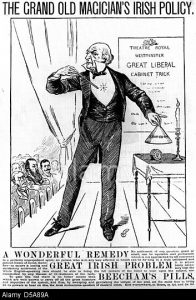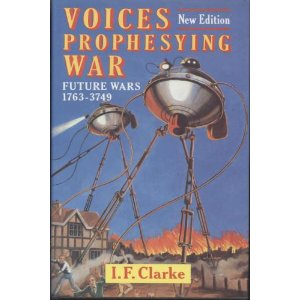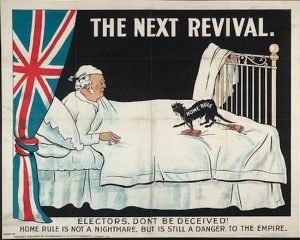As part of our ongoing series about SFF in Ireland, today we present a short piece by Edward James on the role of Home Rule and how it has affected Science Fiction. With many prominent science fiction authors writing over this period, there are many references or allusions to Home Rule, and the repercussions it might have on the future.
Edward James is Emeritus Professor of Medieval History at University College, Dublin. His website, Science Fiction and Fantasy Writers in the Great War, won the award for Best Non-Fiction of 2014 in the British Science Fiction Association Awards.
In the history of science fiction, Sir George Chesney’s The Battle of Dorking plays an important role. It was published in 1871, in the wake of the widespread worries that followed the astonishingly rapid victory of the Prussian army over France, and it helped to inspire a whole sub-genre of stories about future wars. H.G. Wells’s The War of the Worlds (1898) was in part a commentary of this sub-genre; but his The War in the Air (1908) and The World Set Free (1914) were both distinguished contributions to it. The whole slew of stories, written in Britain, France and Germany, has been catalogued and discussed in several books by I.F. Clarke, most notably Voices Prophesying War (1966). They were mostly warnings about the dangers of being poorly prepared for war. They were intended to have a real and direct effect on public opinion; and some of them probably did. The cumulative effect must certainly have led people in the decade or two before 1914 to expect a Great War some time in the near future.
Clarke mentions, but does not discuss, the little sub-sub-genre stories about future wars in Ireland. Most of these were a response to the first Home Rule Bill, introduced by Gladstone in 1886. In 1986, I published a study of some of these, which you can download from here if you were interested.

There had been some proto-science fiction about a future, prosperous, united Ireland: John Francis Maguire, for instance, a Mayor of Cork, prophesied in his three-volume The Next Generation (1871) that Home Rule would be good for all, Catholic and Protestant alike. But the works inspired by the Home Rule Bill were very different. They were almost all written by Protestants, and mostly written in what the anonymous author of The Great Irish Rebellion of 1886 (1886) referred as “The North! The glorious patriotic North! True Orange, loyal Ulster!”. The plots are very predictable. The dastardly Gladstone gives Ireland Home Rule; chaos ensues, and Catholics start massacring landlords and/or Protestants; an army of brave Protestants assembles in the North, and marches towards Dublin; the Protestants defeat the Nationalists and reverse Home Rule. Everyone is happy (even, eventually, the Nationalists). It is interesting that more than one of them blames not the Irish themselves, but outsiders, namely, Irish-Americans: “it was generally felt that this nest of vipers had done more to foment discord and work destruction than any other agency except perhaps the hierarchy of the Roman Church.” (That is from Edward Lester’s The Siege of Bodike: A Prophecy of Ireland’s Future, Manchester and London, 1886). I wonder if that celebrated Irish-American Éamon De Valera ever encountered these stories?
It is an odd fact (and one that should perhaps be explored in a panel at Dublin 2019, should we win the Bid) that until recently most Irish science fiction was Protestant (indeed, the most distinguished early writers of fantasy (Lord Dunsany and C.S. Lewis) came from the Protestant tradition too). There is in fact not a lot of Irish science fiction at all between Jonathan Swift and the generation of James White and Bob Shaw; which means that these political tales from 1886 and beyond, however undistinguished they may be from a literary point of view, should not be forgotten.



